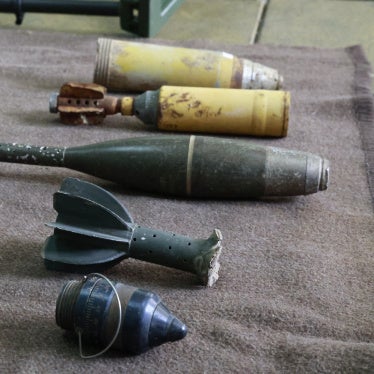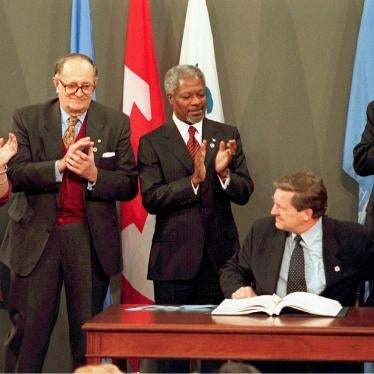Thank you Mr. President.
Two years after the Convention on Cluster Munitions entered into force, overall compliance with the treaty has been impressive. There have been no allegations of use or other grave violations by States Parties, and States Parties have vocally condemned use by states not party. State Parties have also engaged in extensive destruction of stockpiles at an early date and have been clearing contaminated land. Three quarters of them have submitted initial transparency reports. According to the Cluster Munition Monitor, “States Parties and signatories are demonstrating great determination to implement all aspects of the convention rapidly and thoroughly.”
Debate about the interpretation of certain provisions, however, has lingered since the convention’s adoption in Dublin. If not addressed, contradictory views on these issues could one day trigger Article 8’s compliance mechanism.
The debate centers around Article 1(1)(c), which prohibits absolutely assistance with banned activities. The article says that States Parties may not “under any circumstances … [a]ssist, encourage or induce anyone to engage in any activity prohibited to a State Party under this Convention.” The Cluster Munition Coalition wishes to reiterate its position that the prohibition on assistance applies at all times, even during joint military operations, and that it encompasses bans on transit, foreign stockpiling, and investment.
The convention explicitly allows participation in joint military operations with states not party, but it does not create exceptions to the prohibition on assistance in such situations. Article 21 should be understood as a clarification that joint operations are permitted, not a qualification to the convention’s absolute prohibition, which applies “under any circumstances.” There are many legal arguments to bolster this position. For example, a different interpretation of Article 21 would make the article internally inconsistent. It would mean that the same article would both require States Parties to discourage use of cluster munitions and allow them to assist with use.
According to the Cluster Munition Monitor, at least 35 States Parties and signatories have agreed with this position. Seven new members joined that list in the past year, a sign that this understanding of the treaty continues to gain authority.
The prohibition on assistance should also be understood to ban transit of cluster munitions by a state not party through a State Party’s territory. Allowing transit would be a form of assistance with transfer and potentially with use of cluster munitions by a state not party.
According to the Cluster Munition Monitor, at least 31 states have declared the convention prohibits transit.
Article 1(1)(c) should be read similarly as prohibiting stockpiling by a state not party of cluster munitions on a State Party’s territory. Granting permission for foreign stockpiling would represent assistance with stockpiling and indirectly with use.
According to the Cluster Munition Monitor, at least 28 states have expressed the view that the convention prohibits foreign stockpiling.
Finally, CMC believes the prohibition on assistance bans direct and indirect investment in the production of cluster munitions. According to the Cluster Munition Monitor, 23 States Parties and signatories share this view. Six states have enacted legislation explicitly prohibiting investment, and a number of others have done so through national policies.
Despite growing support for the position that the prohibition on assistance does, as the convention says, apply under all circumstances, which would include joint military operations, a handful of States Parties and signatories have articulated the opposite interpretation in statements, and more disturbingly in some cases, in national implementation legislation.
As my CMC colleague explained in an earlier intervention, Canada, for example, has proposed legislation that would permit its armed forces, during joint military operations, to “direct or authorize” use, acquisition, stockpiling, or transfer of cluster munitions by a state not party. In addition, Canadian forces themselves could use cluster munitions when on secondment to an ally that has not joined the convention.
Australia has recently enacted extremely problematic legislation. The law allows its military personnel to assist with cluster munition attacks by states not party, and it creates explicit exceptions for transit across and foreign stockpiling of cluster munitions in the country’s territory. The provisions not only run counter to the prohibition on assistance but also contravene Article 9, which requires penal sanctions for activities prohibited by the convention and “undertaken by persons or on territory under its jurisdiction or control.”
Such interpretations of the convention, which are in the minority, are contrary to both the language of the treaty and its underlying aim. The vice-president of the ICRC warned in her statement during the opening ceremony that “more vigilance is needed to ensure that States Parties involved in multinational military operations adopt national implementing legislation that is consistent with both the letter of the Convention and its object and purpose.” That purpose is to eliminate cluster munitions and the suffering they cause.
In conclusion, the CMC urges states to uphold the prohibition on assistance in all circumstances, even joint military operations. In order to solidify a strong interpretation of the convention that aligns with its letter and spirit, we call on all States Parties to make public statements declaring their commitment to an absolute prohibition and to adopt strong national implementation legislation that stays true to the ban on cluster munitions.
Thank you.







